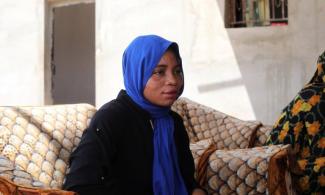
The couple's story is one of many cases of the risks facing migrants who are planning to reach Europe.
A Nigerian couple heading to Europe, Mark and Halima William have shared their ugly experiences of separation and suffering after being detained and forced into prostitution respectively by ruthless smugglers in Libya.
The couple who wanted to use the North African country as a link from Nigeria to Europe have a safe house supported by the United Nations and the medical charity Medecines Sans Frontieres (MSF) also known as Doctors Without Borders, to thank for their safety and reunion, Reuters reports.

Migrants continue to suffer unimaginable crimes in Libya, according to the UN.
The number of people trying to cross through the African nation to Europe has grown this year as the UN migration agency, International Organization for Migration revealed that there are more than 500,000 registered migrants in Libya, many of whom find themselves at the mercy of human smugglers.
According to Reuters, the 23-year-old Halima who crossed the desert from Nigeria to Libya in the hope of eventually reaching Europe, was forced into prostitution, while her husband Mark, 27, also faced detention and abuse. Finally, each of them was able to escape and find refuge in a rare safe house.
The two were later reunited by mere chance at the safe house in the town of Bani Walid, where they have been staying for the time being. While they are still traumatised by the inhumane treatment, they never give up on getting to their destination which is Italy.
The couple's story is one of many cases of the risks facing migrants who are planning to reach Europe but who instead end up trapped in a country which remains chaotic and violent.
Mark left Nigeria first in 2016 and was smuggled into Libya across the desert border in a car. When he got to Bani Walid, 180 kilometers south of the Libyan capital Tripoli, he was detained by armed men and held for seven months for ransom.
He eventually paid them and found work in Bani Walid as a builder, planning his reunion with Halima by phone to travel onwards.
Halima then came to Libya in 2018, using the same route as Mark. When she reached Tripoli she was sold into prostitution. Without a Libyan phone, she could not contact Mark.
After four months Halima managed to escape and reach the safe house, which is supported by the United Nations and the medical charity, MSF. The shelter provides food and medical care, and is funded by donations from locals. It has been in operation since 2015 and currently hosts 12 migrants.
Halima felt overjoyed when she found that her husband was already there: "I hug him and kiss him and start crying. He was crying too," she told Reuters.
The founder of the safe house, Al-Hussein Bin Gharsa, said he wanted to show the true, kindly nature of Libyans and of the citizens of Bani Walid: "This is a city of generosity and hospitality."